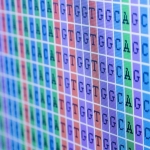Genomics is the study of the complete set of DNA of an organism, including its sequence, organization, function, and evolution. The study of genomics incorporates a wide variety of experimental, computational, and statistical methodologies and has been greatly accelerated in recent years with the advent of next-generation sequencing technologies, high-density molecular assays (e.g. microarrays, droplet PCR), and advances in computational biology and biostatistics. Genomic research within the Department of Biology spans a wide range of subdisciplines including functional genomics, population and evolutionary genomics, and developmental genomics.
Genomics
People
- Professor of Biology
- Arts and Sciences Distinguished Professor of Biology
- Professor of Biology
- Benjamin E. Powell Distinguished Professor of Biology
- Professor of Biology
- Professor of Biology
- Professor of Biology
- Associate Professor of Biology
- Professor of Biology
- Jack H. Neely Associate Professor of Biology
- Associate Professor of the Practice of Biology
- Visiting Professor of Evolutionary Anthropology
- Professor of Biology
- Professor of Biology
- Professor of Biology
















